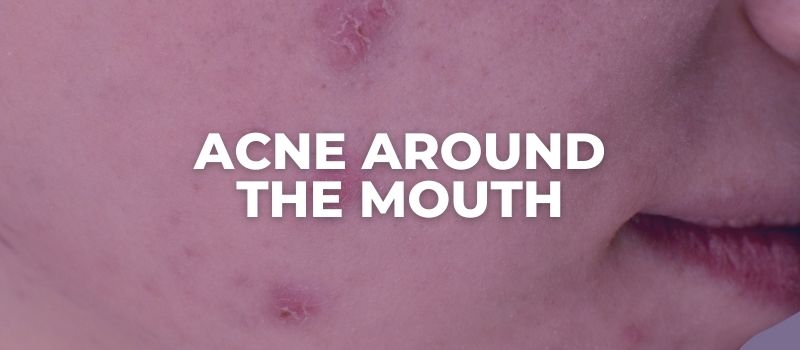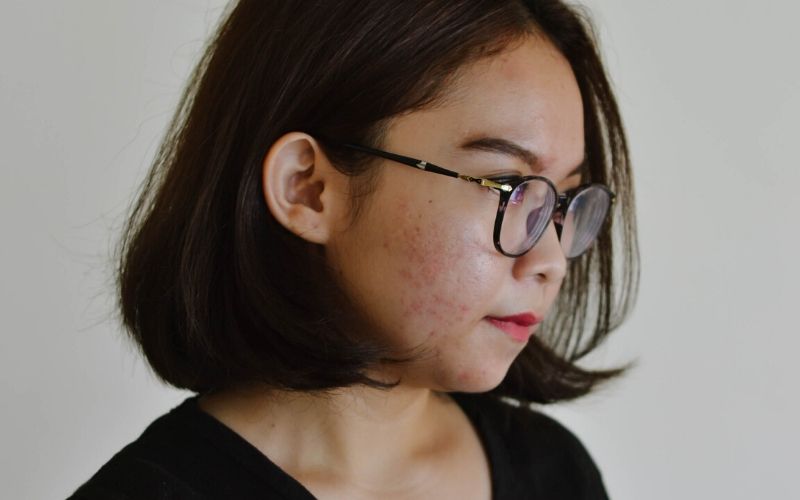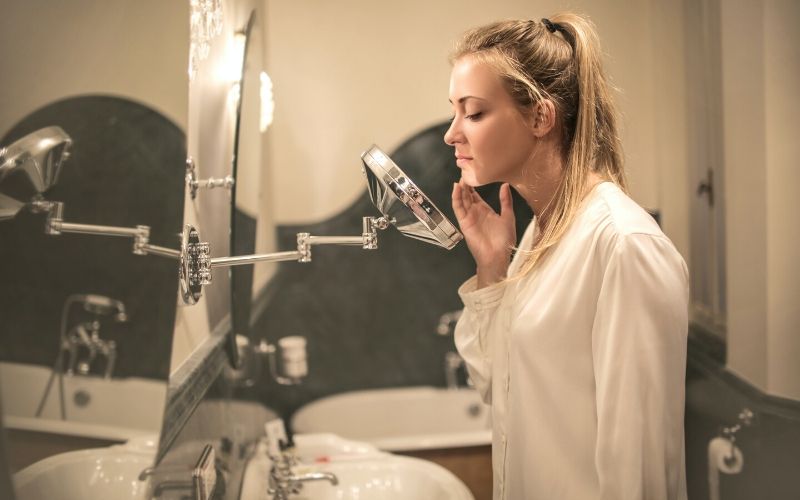• Acne around the mouth is a common occurrence that typically manifests itself in the form of solid red or purple bumps.
• The main cause of acne around the mouth and chin are clogged pores. Pores on the skin can become clogged with excess oil, dead skin cells, and white blood cells.
• Many skincare products contain heavy and pore-clogging ingredients that can worsen those pesky little bumps around the mouth.
• Bacteria stuck onto your phone screen can easily be transmitted onto your skin, especially if you rest your cell phone on your chin while you talk.
• Processed foods such as sweets can rapidly raise your blood sugar and contribute to excess production of the hormone insulin, which can cause acne around.
Acne around the mouth is a common occurrence that typically manifests itself in the form of solid red or purple bumps that often have a collection of pus at the top, but this doesn’t always have to be the case.
To heal acne around the mouth, you should start with implementing good skincare habits and pay special attention to exfoliation as this is the best solution for many skin concerns, including acne.
However, it’s not always that simple and you first need to know what’s triggering your acne in order to choose an adequate treatment, so in this article, I will teach you what do these spots usually mean, what causes them, as well as how to heal acne around the mouth.

What Causes Acne Around The Mouth?

The main cause of acne around the mouth and chin are clogged pores. Pores on the skin can become clogged with excess oil, dead skin cells, and white blood cells, creating the perfect, airless environment inside the pore for bacteria to thrive.
Some of the most common things that can cause acne around the mouth and chin are hormonal changes due to various reasons, bad skincare products, poor hygiene, a very bad diet, etc.
Let’s address a few of these and how could they possibly affect you…
Using bad skincare products
Many skincare products contain heavy and pore-clogging ingredients that can worsen those pesky little bumps around the mouth and also contribute to acne starting to appear in other areas, too.
Additional to that, there are also products containing ingredients that are too harsh and have the potential to damage your skin barrier so using them might harm the skin’s moisture-holding capacity.
Some of these are drying alcohols such as Alcohol denat as well as fragrance and other fragrant components that can awfully irritate and dehydrate the skin.
When this happens, the skin can become sensitized and dehydrated, which will inevitably trigger the sebaceous glands to overproduce oil which can then clog the pores and cause more acne.
Cell phone use
Nobody ever thinks of this, however, this may very well be the trigger of the acne around your mouth and chin.
Bacteria stuck onto your phone screen can easily be transmitted onto your skin, especially if you rest your cell phone on your chin while you talk.
Your diet can affect your skin
Processed foods such as sweets can rapidly raise your blood sugar and contribute to excess production of the hormone insulin which can cause acne around the mouth.
Sugar rush makes your body work hard to get back to normal levels and this roller coaster of ups and downs can leave you feeling nervous, foggy, irritable, drained, and stressed.
Moreover, having a diet rich in calories, fat, and refined carbohydrates such as burgers, nuggets, fries, etc, can cause acne due to the potential hormone-altering effect.
This, however, isn’t scientifically proven, though it is important to note that most of the research on the connection between fast food and acne has used self-reported data.
Hormones can sometimes cause acne around the mouth
Hormones can often be blamed for triggering acne breakouts. This is almost always the case when it comes to puberty, pregnancy, and occasional pimples you get during your period.
Additionally to this, hormones released during stressful situations can also stimulate the sebaceous glands to produce more oil which then leads to more clogging and acne breakouts.
And while this may sound like something you cannot control, you definitely can and I am going to teach you how to combat acne caused by hormones with nothing but good skincare and a little bit of self-love.
How To Get Rid Of Hormonal Acne?

No matter the cause, Hormonal acne is a condition that you should start addressing by focusing on having a good skincare regimen. An adequate skincare routine for your skin type is the first step in getting rid of hormonal acne.
Besides this, in order to get rid of hormonal acne, you should also pay attention to having a healthy diet as well as a few exercises that will help you minimize stress on a day-to-day basis and help you lead a happier lifestyle.
Some of the most efficient ingredients for getting rid of acne are:
Salicylic Acid
Salicylic Acid is one of the mildest and most effective acne-treating ingredients you can possibly find.
Salicylic acid works by mimicking the natural exfoliation process of younger skin by helping it shed extra layers of dead skin cells at a quicker rate than normal.
This means that you have less dead skin cells on the surface of the skin that can potentially clog your pores and lead to unwanted acne breakouts.
Additionally, salicylic acid is an oil-soluble ingredient, which means it can cut through the surface oil to get inside the pores and remove the buildup of sebum, bacteria, dead skin cells, and white blood cells.
Furthermore, it is a very gentle, anti-inflammatory ingredient that is easily tolerated by the skin and it takes very little time to get used to.
Read my comparison review between the two most popular salicylic acid products on the market.
Benzoyl Peroxide
Benzoyl Peroxide is an ingredient that’s proven to have an antibacterial effect that specifically inhibits and destroys the acne-causing bacteria P. acnes that live deep in your pores and survive on your natural oil, dead skin cells, and skin tissue.
It can be quite drying for the skin if not used properly. This is why many people experience side effects that include sensitive skin, burning sensation, redness, peeling, and inflammation.
However, there are many ways that you can go wrong with using benzoyl peroxide. Still, if used properly, it can successfully heal your acne without having any adverse effects on the skin.
Retin-A.
Retin-A is one of the most popular prescribed medications used to treat acne. Its generic name is tretinoin and it falls under a class of medications called retinoids.
Retinoids are derived from vitamin A and they work to make skin cells grow and function more effectively.
Dermatologists often prescribe them for various acne concerns as this is also an excellent ingredient that decreases the number and severity of acne and promotes quicker healing of pimples.
Retinoids come in many forms, including gels, creams, and lotions, and besides acne, they are also used to treat psoriasis, slow down skin aging, and some cancers.
Tretinoin products that contain higher percentages of tretinoin are usually used to treat severe cystic acne as they work by unblocking the clogged follicles that initially cause the formation of acne.
While Retin-A might sound somewhat intimidating and scary, it is definitely not something you should be scared of. Retin-A can have some side effects but this can be the case for any other product.
Some side effects might include tingling or burning on the skin, redness, mild to moderate peeling, and increased sun sensitivity.
This simply tells us that Retin-A should be used responsibly and followed up with richer and more moisturizing creams and an adequate amount of sunscreen in the mornings.
5 Additional Tips For Healing Acne Around Your Mouth
Besides using adequate skincare treatment and having an overall good skincare routine, try to implement several things that might trigger acne around the mouth and the jaw.
- Clean your cell screen regularly
- Change your pillowcases regularly
- Avoid using towels and let the skin dry on its own after cleansing
- Avoid using heavy makeup and always cleanse your skin before bed
- Avoid using oils on your skin
Mouth Acne: Related Questions
![]()
What Do Acne Spots Around The Mouth Mean?
Spots around the mouth could mean anything; therefore, it is important to dig a little deeper and figure out what you have been doing recently that could’ve possibly led to a breakout.
You should always take your hygiene and skincare habits into consideration as these can often be the main acne triggers.
On the other hand, you have eczema on your face and start noticing isolated spots around the mouth. This could mean that there is a condition known as perioral dermatitis present in the area.
If this is not the case, however, spots on the chin, jaw, and around the mouth could also signal hormonal changes in your body that could be caused by various factors, including stress, high-sugar diet, etc.
What is Perioral Dermatitis?
Simple put, perioral dermatitis is a skin condition that is characterized by redness, bumps, and pimples around the mouth. It is often caused by the use of topical steroids or other creams and lotions that are too strong for the skin.
It can also be triggered by hormonal changes in the body, as well as an imbalance in bacteria on the skin.
NB: Perioral dermatitis is that it is often misdiagnosed as acne, so it is important to consult a dermatologist (or your healthcare provider) if you are experiencing any of the symptoms.
BONUS: Can Kissing Cause Acne Around The Mouth?
No, acne cannot be transmitted through kissing because acne is not a contagious skin condition.
If you have acne, or someone you know has acne, you can safely touch, kiss, and hug without having the fear that you are going to “catch” the condition.
On the other hand, you should always be aware not to share your personal items such as towels or soaps, simply because you want to prevent the bacteria from spreading as this is something that can potentially worsen the problem for the person that has acne.

My name is Simone and I am a certified skin specialist. I created this website to teach my readers how to take great care of their skin and I also like to occasionally share my honest opinions on skincare products I’ve tried. You can learn more about me here.
